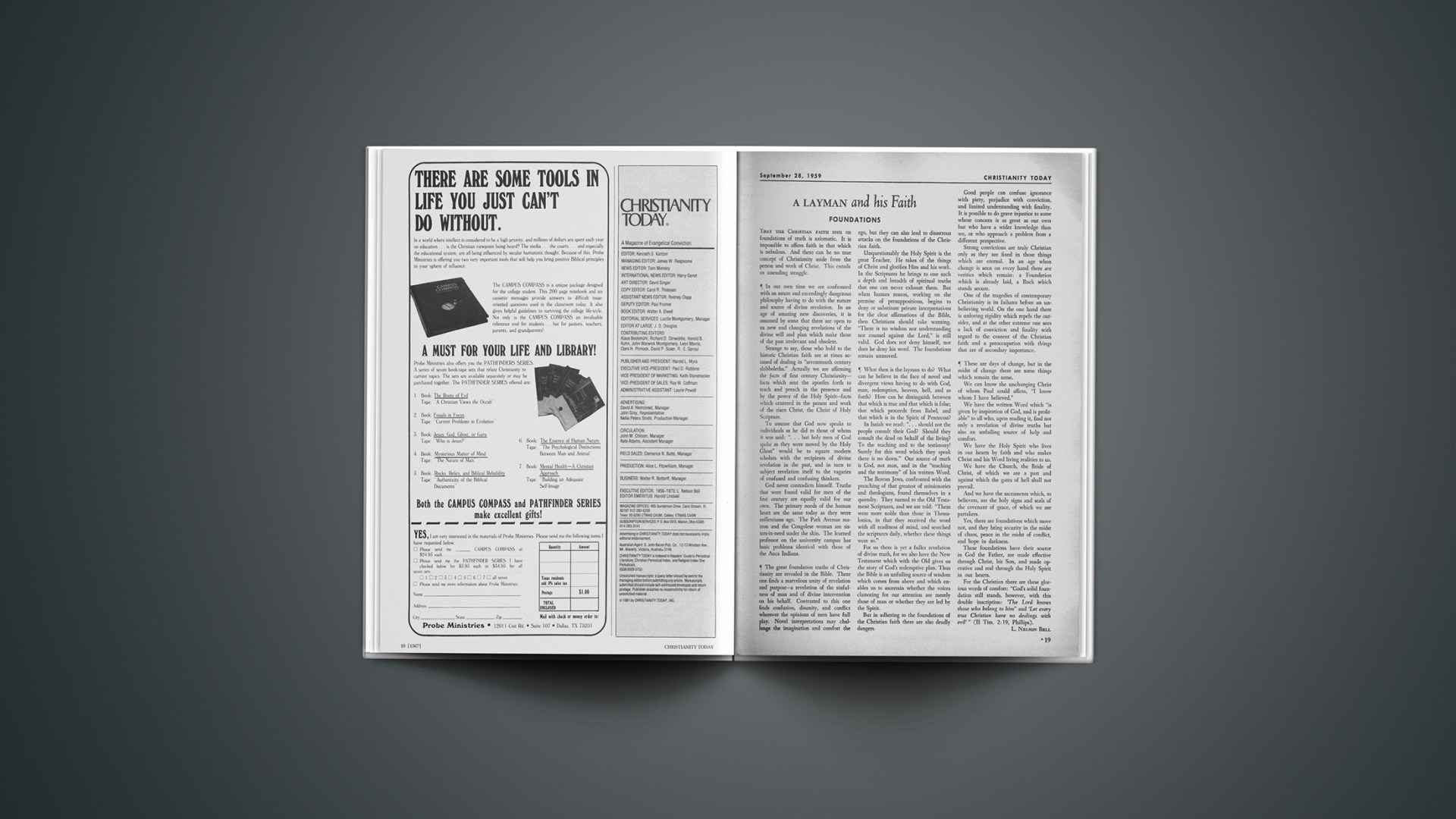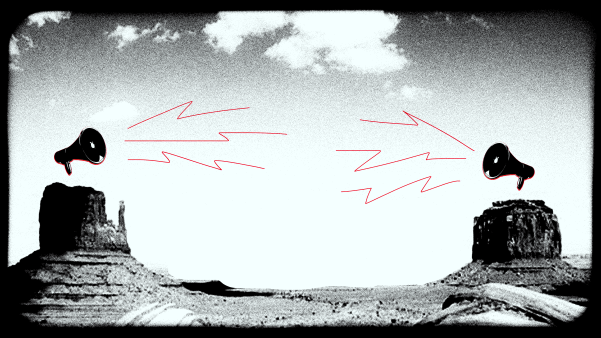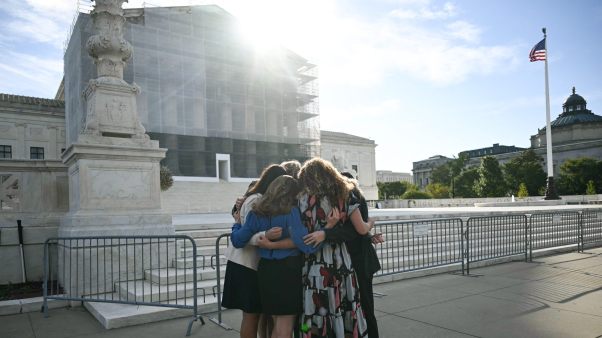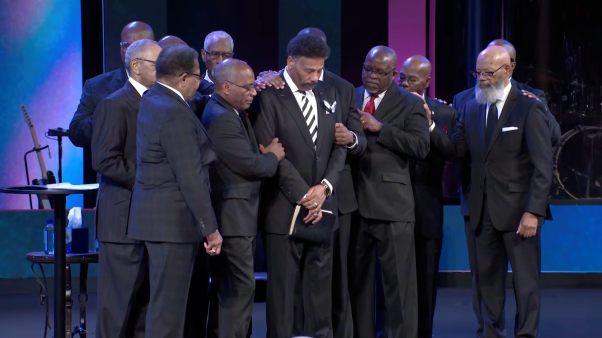THAT THE CHRISTIAN FAITH rests on foundations of truth is axiomatic. It is impossible to affirm faith in that which is nebulous. And there can be no true concept of Christianity aside from the person and work of Christ. This entails an unending struggle.
In our own time we are confronted with an astute and exceedingly dangerous philosophy having to do with the nature and source of divine revelation. In an age of amazing new discoveries, it is assumed by some that there are open to us new and changing revelations of the divine will and plan which make those of the past irrelevant and obsolete.
Strange to say, those who hold to the historic Christian faith are at times accused of dealing in “seventeenth century shibboleths.” Actually we are affirming the facts of first century Christianity—facts which sent the apostles forth to teach and preach in the presence and by the power of the Holy Spirit—facts which centered in the person and work of the risen Christ, the Christ of Holy Scripture.
To assume that God now speaks to individuals as he did to those of whom it was said: “… but holy men of God spake as they were moved by the Holy Ghost” would be to equate modern scholars with the recipients of divine revelation in the past, and in turn to subject revelation itself to the vagaries of confused and confusing thinkers.
God never contradicts himself. Truths that were found valid for men of the first century are equally valid for our own. The primary needs of the human heart are the same today as they were milleniums ago. The Park Avenue matron and the Congolese woman are sisters-in-need under the skin. The learned professor on the university campus has basic problems identical with those of the Auca Indians.
The great foundation truths of Christianity are revealed in the Bible. There one finds a marvelous unity of revelation and purpose—a revelation of the sinfulness of man and of divine intervention on his behalf. Contrasted to this one finds confusion, disunity, and conflict wherever the opinions of men have full play. Novel interpretations may challenge the imagination and comfort the ego, but they can also lead to disastrous attacks on the foundations of the Christian faith.
Unquestionably the Holy Spirit is the great Teacher. He takes of the things of Christ and glorifies Him and his work. In the Scriptures he brings to one such a depth and breadth of spiritual truths that one can never exhaust them. But when human reason, working on the premise of presuppositions, begins to deny or substitute private interpretations for the clear affirmations of the Bible, then Christians should take warning. “There is no wisdom nor understanding nor counsel against the Lord,” is still valid. God does not deny himself, nor does he deny his word. The foundations remain unmoved.
What then is the layman to do? What can he believe in the face of novel and divergent views having to do with God, man, redemption, heaven, hell, and so forth? How can he distinguish between that which is true and that which is false; that which proceeds from Babel, and that which is in the Spirit of Pentecost?
In Isaiah we read: “… should not the people consult their God? Should they consult the dead on behalf of the living? To the teaching and to the testimony! Surely for this word which they speak there is no dawn.” Our source of truth is God, not man, and in the “teaching and the testimony” of his written Word.
The Berean Jews, confronted with the preaching of that greatest of missionaries and theologians, found themselves in a quandry. They turned to the Old Testament Scriptures, and we are told: “These were more noble than those in Thessalonica, in that they received the word with all readiness of mind, and searched the scriptures daily, whether these things were so.”
For us there is yet a fuller revelation of divine truth, for we also have the New Testament which with the Old gives us the story of God’s redemptive plan. Thus the Bible is an unfailing source of wisdom which comes from above and which enables us to ascertain whether the voices clamoring for our attention are merely those of man or whether they are led by the Spirit.
But in adhering to the foundations of the Christian faith there are also deadly dangers.
Good people can confuse ignorance with piety, prejudice with conviction, and limited understanding with finality. It is possible to do grave injustice to some whose concern is as great as our own but who have a wider knowledge than we, or who approach a problem from a different perspective.
Strong convictions are truly Christian only as they are fixed in those things which are eternal. In an age when change is seen on every hand there are verities which remain: a Foundation which is already laid, a Rock which stands secure.
One of the tragedies of contemporary Christianity is its failures before an unbelieving world. On the one hand there is unloving rigidity which repels the outsider, and at the other extreme one sees a lack of conviction and finality with regard to the content of the Christian faith and a preoccupation with things that are of secondary importance.
These are days of change, but in the midst of change there are some things which remain the same.
We can know the unchanging Christ of whom Paul could affirm, “I know whom I have believed.”
We have the written Word which “is given by inspiration of God, and is profitable” to all who, upon reading it, find not only a revelation of divine truths but also an unfailing source of help and comfort.
We have the Holy Spirit who lives in our hearts by faith and who makes Christ and his Word living realities to us.
We have the Church, the Bride of Christ, of which we are a part and against which the gates of hell shall not prevail.
And we have the sacraments which, to believers, are the holy signs and seals of the covenant of grace, of which we are partakers.
Yes, there are foundations which move not, and they bring security in the midst of chaos, peace in the midst of conflict, and hope in darkness.
These foundations have their source in God the Father, are made effective through Christ, his Son, and made operative and real through the Holy Spirit in our hearts.
For the Christian there are these glorious words of comfort: “God’s solid foundation still stands, however, with this double inscription: ‘The Lord knows those who belong to him” and ‘Let every true Christian have no dealings with evil’” (2 Tim. 2:19, Phillips).










